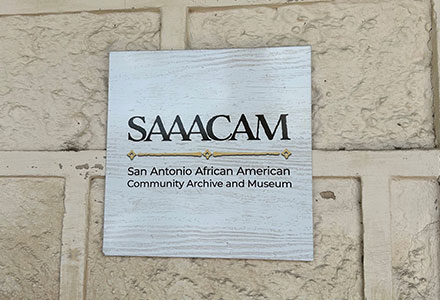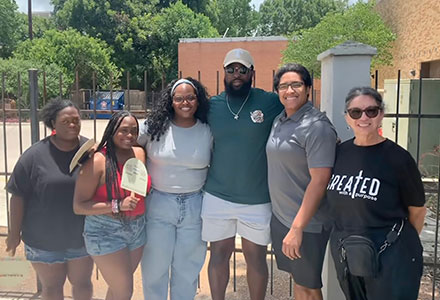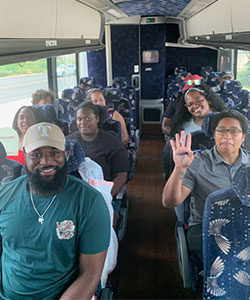UIW Students Learn the Significance of Black History in San Antonio as they observe Juneteenth
On Thursday, June 19, 2025, the nation observed the annual federal Juneteenth holiday, recognizing how on June 19, 1865, the official word of emancipation reached Texas, declaring freedom for enslaved people more than two years after the Emancipation Proclamation. For many Black communities, Juneteenth is viewed as their “true” or even “second” Independence Day. The day is often celebrated in a variety of ways that foster reflection, education and awareness within communities.
 This Juneteenth, the social justice advocates of UIW’s student-led group “As One We Will” (AOWW) were invited by the San Antonio African American Community Archive and Museum (SAAACAM) to participate in the “Green Book Civil Right Bus Tour.” This tour takes place in historic east side neighborhoods and offers an opportunity for participants to “uncover the stories of African American entrepreneurship, resilience, community and travel” (saaacam.org).
This Juneteenth, the social justice advocates of UIW’s student-led group “As One We Will” (AOWW) were invited by the San Antonio African American Community Archive and Museum (SAAACAM) to participate in the “Green Book Civil Right Bus Tour.” This tour takes place in historic east side neighborhoods and offers an opportunity for participants to “uncover the stories of African American entrepreneurship, resilience, community and travel” (saaacam.org).
President of AOWW Taylor Demby noted that AOWW was informed of this opportunity by Associate Vice President for Mission and Ministry Dr. Arturo Chavez. She expressed that it was an incredible honor to be invited by the SAAACAM, as they’ve played a vital role in preserving Black history in San Antonio. She says, to have the invitation extended to her and the other members of AOWW felt humbling, empowering and emphasized the importance of their work as student advocates.
 “It’s imperative that we observe Juneteenth in ways that are rooted in education and reflection,” shared Demby. “In San Antonio, Black-American history has often been treated as a footnote when, in reality, it’s foundational. Last Juneteenth for our 3rd annual celebration, AOWW had the pleasure of bringing civil rights leader and native San Antonian Mario Salas to campus to speak about Black resilience in Texas during the Emancipation era. This year, participating in the Green Book Civil Rights Bus Tour felt like a natural and powerful continuation of that work. This event allowed us to get a more tangible sense of how our history lives in place; in buildings, landmarks, street names, etc.”
“It’s imperative that we observe Juneteenth in ways that are rooted in education and reflection,” shared Demby. “In San Antonio, Black-American history has often been treated as a footnote when, in reality, it’s foundational. Last Juneteenth for our 3rd annual celebration, AOWW had the pleasure of bringing civil rights leader and native San Antonian Mario Salas to campus to speak about Black resilience in Texas during the Emancipation era. This year, participating in the Green Book Civil Rights Bus Tour felt like a natural and powerful continuation of that work. This event allowed us to get a more tangible sense of how our history lives in place; in buildings, landmarks, street names, etc.”
During the tour, Demby recognized how recent much of the history they were learning was, noting how many elder members on the tour were remembering much of what was referenced because they lived it. She found that one historic landmark, Hicks Beauty School, even had ties with her own family. With her grandmother being an early 1960’s graduate from the school before its demolition, and her paternal grandfather being the cousin of Ms. Jessie Mae Hicks, the founder of Hicks Beauty School, who often spent time there on his off days when he was stationed in San Antonio during the Vietnam War.
 “I’m blessed to still have my grandparents in my life, and this tour gave me something special I can reminisce with them about,” shared Demby. “While still on the tour, I texted my grandmother saying ‘You’re a part of Black history’ to which she responded ‘Yes, I am.’”
“I’m blessed to still have my grandparents in my life, and this tour gave me something special I can reminisce with them about,” shared Demby. “While still on the tour, I texted my grandmother saying ‘You’re a part of Black history’ to which she responded ‘Yes, I am.’”
Demby wasn’t the only one who benefitted from the tour, as she acknowledged that the other members of AOWW were informed on how the present-day activism they engage in connected the significant efforts of prior generations, even of those located in the same region. With this being her first time participating in the tour, attending alongside and on behalf of AOWW added to the meaningfulness of the experience.
“UIW is committed to experiential learning that engages our students in an unflinching search for the truth,” said Chavez. “This amazing tour took us on a journey not only to historic sites in our city, but also an examination of conscience. When we refuse to learn from history, we don’t contextualize our present realities. Also, we fail to see the strength, joy and resilience of people who struggled to maintain their dignity and fight for social change. These history lessons are especially important for our student leaders to be enlightened and concerned citizens.”

